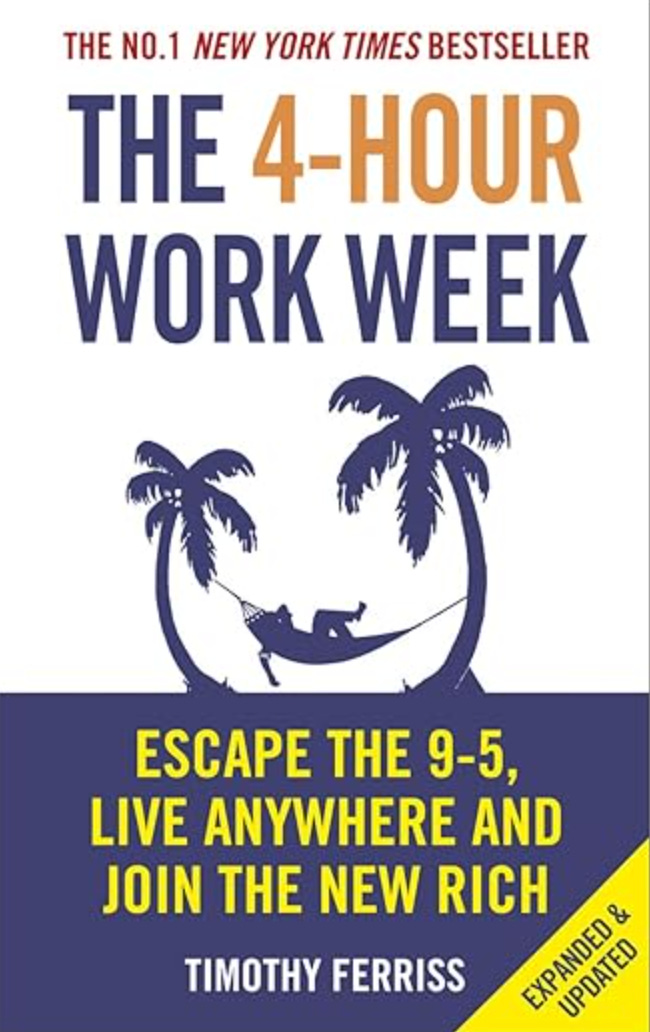Background
If you unaware of Tim Ferris it is difficult to describe him in one word. His work varies. He is a podcaster, author, business owner, angel investor and all-round productivity guru (You can replace guru with a more amenable term). I’ve been aware of him for some time now and had previously subscribed to his newsletter ‘5 Bullet Friday’ where he outlines five things he’s found interesting throughout the course of his week. About a year ago I went through an unsubscribing phase from my inbox and gave his newsletter the boot. Since then, he has remained out of sight and out of mind. But recently he popped back up on my radar when he sat down with Chris Williamson on the Modern Wisdom podcast for a three-hour chat. It was a relatively laid back, entertaining conversation and it piqued my interest enough to listen to the updated audiobook of his historically famous ‘The 4 Hour Workweek’.
Originally the book was released in 2007, 17 years ago, with the promise for the reader to ‘Escape 9-5, Live Anywhere, And Join the New Rich.’ It is certainly of the self-help genre and slightly outdated but fascinating. The version I listened to was updated in 2009 to include numerous case studies from those who had put Tim’s methods into practice. I would recommend this version to listen to because it gives real life stories from those who took a different approach to work-life balance. Who doesn’t like good stories? If you have a Spotify Premium subscription you can listen to it as part of your plan.
Why did I find it fascinating?
I found it fascinating because Ferris was a strong advocate for the choice of remote working from the outset. He launched his own supplement BrainQUICKEN in the early 2000’s and found himself dramatically overworked trying to keep it afloat and then maintain its profitability. To avoid burnout, he developed systems of work that allowed him to run his business effectively whilst living abroad and doing what he wanted when he wanted (Tango dancing in Argentina).
I’m not going to get into the weeds of it too much here but essentially the contents of the book centres on the D.E.A.L Framework. This is an acronym for Define, Eliminate, Automate, and Liberate. Define the lifestyle you want, eliminate unnecessary tasks and distractions, automate your income and liberate yourself from traditional working constraints.
Tim is an influential figure for many in the podcasting/productivity space and certainly some of his tips and tricks are excellent, informative and will make you question whether you are overcomplicating your work.
Limitations of the Book
With most self-help books there are certain limitations. The effort required to write any book is gargantuan and for this reason I try not to be too overly critical when analysing them, but considering its popularity and age I feel I can critique this freely as Tim has made his money at this point, the rascal.
‘The 4-Hour Workweek’ is very all-or-nothing in its approach. Extreme in many ways and slightly fanciful for those who have real life commitments. If your job requires you to be hands on in any way, say those who work with patients in a hospital or in a trade, it could be hard to ask a superior for the option to work from home.
Additionally, through no fault of the author, the book is slightly dated given the rapid growth of the internet and the enormous hold social media now has on everyone’s lives. He may argue that this is a help. To Tim’s credit he breaks down step by step how to effectively sell a product online but some of the websites he promotes are outdated and possibly extinct. There are so many website recommendations throughout the book that if you are listening to it whilst commuting then it would be impossible to remember them all.
The book is 400 pages so will require some time to read if you tend to doom scroll every five minutes.
Further Reading
Tim Ferris has a blog which is entirely free and full of recommendations on how to ‘optimise’ your time and your life. I understand some people could vomit at the word ‘optimise’ so maybe ‘improve’ might be a softer approach. If you have an itch to change your current work environment consume it in some form. The New Yorker also has an article titled ‘Revisiting The 4-Hour Workweek’ for another perspective.
Podcast Below. It’s a long one.




